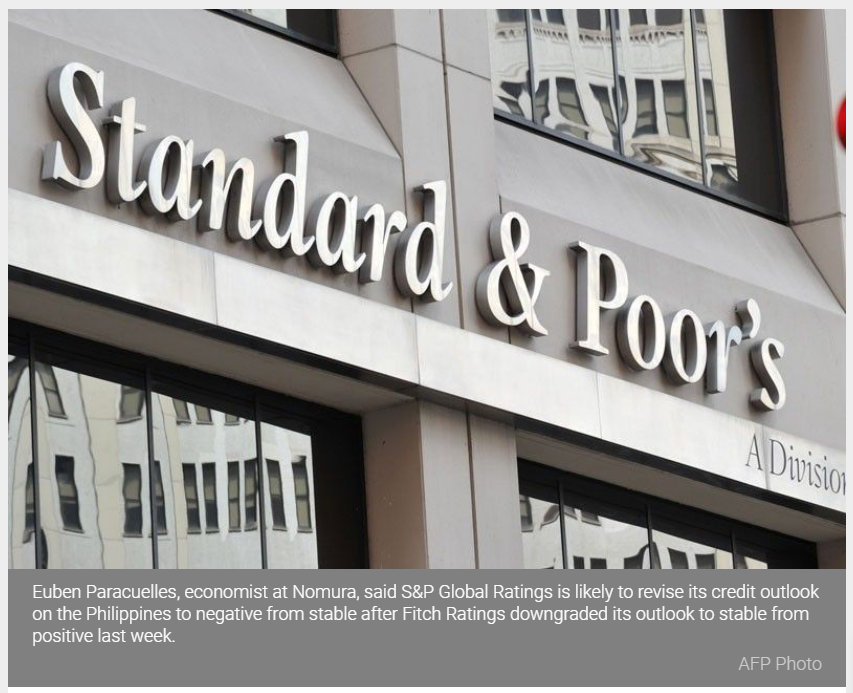Philippine faces more credit downgrades
MANILA, Philippines — The Philippines is facing more downgrades from international credit rating agencies in the coming months as the economic fallout from the coronavirus disease 2019 or COVID-19 pandemic is likely to be felt in the coming years.
Euben Paracuelles, economist at Nomura, said S&P Global Ratings is likely to revise its credit outlook on the Philippines to negative from stable after Fitch Ratings downgraded its outlook to stable from positive last week.
S&P, Fitch and Moody’s Investors Service have previously assigned a stable outlook on the Philippines.
“All three rating agencies now have stable outlooks, but S&P is the one to watch closely from here. We see a rising risk that S&P could revise the outlook to negative over the next six to 12 months,” Paracuelles said.
Prior to Thursday’s revision in outlook, the Philippines received 25 straight favorable actions from the three debt watchers since 2006 with Fitch raising the country’s credit outlook to positive just last February, while S&P upgraded the rating to BBB+ or just a notch below the A-coveted rating in April last year.
“A key support for its rating upgrade to BBB+ last year was its assessment of a strong growth trajectory, which is now undermined by the COVID-19 shock and subsequent measures to contain the local outbreak,” Paracuelles said.
Fitch affirmed its BBB rating on the Philippines, while Moody’s has assigned a Baa2 rating, both two notches above minimum investment grade.
Monetary and fiscal authorities said earlier efforts to achieve the much coveted A credit rating from debt watchers has taken a backseat as the government focuses on putting the economy back on its high growth trajectory and creating more jobs to improve the lives of Filipinos.
Paracuelles said Nomura now expects the Philippine gross domestic product (GDP) to shrink by 4.8 percent this year due to the worse than expected contraction of 0.2 percent in the first quarter – the first since the fourth quarter of 1998 when the country’s output contracted by three percent due to the Asian financial crisis.
“Amid signs of acceleration in the number of new daily COVID-19 cases, we believe the government will struggle to relax the lockdown measures effected under the enhanced community quarantine, despite the quarantine’s already substantial impact on the economy,” Paracuelles said.
The Japanese investment house also expects a strong recovery next year with the GDP growing by 8.1 percent due to base effects and still implies economic output that remains well below its pre-COVID-19 levels.
Rizal Commercial Banking Corp. chief economist Michael Ricafort said the GDP contraction could range from two to four percent this year.
“Thus, Philippine GDP could contact further in the second quarter, by about five percent, as the lockdown is already longer at 1.5 months (unless extended further) in the second quarter compared with 0.5 month in the first quarter,” Ricafort said.
Ricafort said it would take about one to two years for the economy to recover, largely depending and as a function of how long the lockdowns would last and how the COVID-19 would be contained, as any sustained economic rebound would also depend on the successful development of a vaccine.
Source: https://www.philstar.com/business/2020/05/11/2013108/philippine-faces-more-credit-downgrades


 English
English




